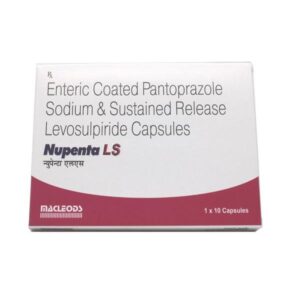PANTOPRAZOLE + LEVOSULPIRIDE
Pantoprazole: Pantoprazole is a drug commonly used for the treatment of stomach and esophageal problems such as gastroesophageal reflux disease (GERD), acid reflux, and ulcers. It belongs to a class of medications called proton pump inhibitors (PPIs).
The mechanism of action of pantoprazole involves reducing the production of acid in the stomach. It works by blocking the enzyme responsible for pumping acid into the stomach, known as the proton pump. By inhibiting this pump, pantoprazole decreases acid secretion, providing relief from symptoms and promoting the healing of ulcers.
Pantoprazole is available in various forms, including tablets and delayed-release capsules. The dosage and duration of treatment depend on the individual’s condition and the severity of symptoms. The drug is usually taken once daily before a meal, preferably in the morning.
As with any medication, pantoprazole may cause certain side effects. Common side effects may include headache, abdominal pain, nausea, diarrhea, flatulence, and dizziness. Rare but more severe side effects may include an allergic reaction (e.g., rash, itching, swelling), severe diarrhea, severe stomach pain, and kidney problems. It is important to seek medical attention if any concerning side effects occur.
Pantoprazole should be used under the guidance of a healthcare professional and the full prescribed course should be completed, even if symptoms improve. It is important to note that pantoprazole is not intended for immediate relief of heartburn symptoms and should not be used for more than 14 days without consulting a doctor.
Levosulpiride: Levosulpiride is a medication used primarily to treat various gastrointestinal disorders such as functional dyspepsia, irritable bowel syndrome, and gastroparesis. It belongs to a class of drugs called selective dopamine D2/D3 receptor antagonists.
The mechanism of action of Levosulpiride involves blocking the postsynaptic dopamine D2 receptors, leading to an increase in the release of acetylcholine, an important neurotransmitter involved in gastrointestinal motility. By enhancing the release of acetylcholine, Levosulpiride helps to regulate gastrointestinal motility and reduce symptoms such as bloating, nausea, and abdominal discomfort.
The usual recommended dose of Levosulpiride varies depending on the condition being treated. For functional dyspepsia and irritable bowel syndrome, the typical starting dose is 25 mg to be taken twice or thrice daily. For gastroparesis, the dose may be higher, usually starting at 50 mg to be taken three times daily. It is important to follow the dosage instructions provided by the healthcare professional.
As with any medication, Levosulpiride can cause certain side effects. Common side effects of Levosulpiride may include headaches, dizziness, sleep disturbances, agitation, breast enlargement or tenderness in both males and females. Some individuals may also experience gastrointestinal side effects such as diarrhea or constipation, heartburn, and increased salivation. Rarely, individuals may experience allergic reactions, movement disorders, or changes in liver enzyme levels. It is essential to consult a healthcare professional if any bothersome or severe side effects occur.
Levosulpiride may interact with other medications and may not be suitable for individuals with certain medical conditions such as a history of heart problems, Parkinson’s disease, or epilepsy. It is recommended to inform the prescribing healthcare professional about any existing medical conditions or medications being taken to ensure the safe use of Levosulpiride.
Overall, Levosulpiride is a medication used for gastrointestinal disorders, primarily acting through the blockade of D2 receptors and enhancing the release of acetylcholine. It should only be used under the guidance of a healthcare professional, as dosage and potential side effects can vary depending on the individual and the condition being treated.




